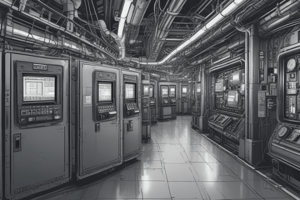Podcast
Questions and Answers
Explain the need of signal transmission in process control system.
Explain the need of signal transmission in process control system.
Signal transmission is needed in process control systems to transmit the measured signals from the field instruments to the control room where the data is processed and used for control purposes. It allows for remote monitoring and control of the processes, ensuring efficient and safe operations.
Explain the principle of I to V Converter.
Explain the principle of I to V Converter.
The principle of I to V Converter is to convert a current signal (I) into a proportional voltage signal (V) using a resistor. The output voltage is directly proportional to the input current, and the conversion is given by the equation $V = I \times R$, where V is the output voltage, I is the input current, and R is the resistance.
Explain the integral control mode.
Explain the integral control mode.
The integral control mode, also known as integral action or reset control, is a control strategy that continuously adjusts the control output based on the integral of the error signal over time. It is used to eliminate the steady-state error in a control system and improve the system's performance.
Explain the pneumatic force balance transmitter.
Explain the pneumatic force balance transmitter.
Explain the feedforward control system.
Explain the feedforward control system.
Flashcards are hidden until you start studying
Study Notes
Process Control Systems
- Signal transmission is necessary in process control systems to transmit information from sensors to controllers and then to actuators to maintain process parameters within setpoints.
I to V Converter
- The I to V (Current to Voltage) Converter is a device that converts an analog current signal to a proportional analog voltage signal.
- The principle of I to V Converter is based on Ohm's Law (V = I × R), where the input current is passed through a known resistance to produce a proportional output voltage.
Control Modes
Integral Control Mode
- In integral control mode, the controller output is proportional to the accumulated error over time, allowing the system to eliminate steady-state error.
- Integral control mode is used to eliminate offset error and achieve a stable process value.
Transmitters
Pneumatic Force Balance Transmitter
- A pneumatic force balance transmitter is a device that converts a process variable (e.g., pressure, level, or flow) into a pneumatic signal (3-15 psi) that is proportional to the process variable.
- The transmitter uses a mechanical balance system to balance the force exerted by the process variable against a pneumatic force, producing a proportional output signal.
Control Systems
Feedforward Control System
- A feedforward control system is a type of control system that uses a model of the process to anticipate and correct for disturbances before they affect the process.
- In a feedforward control system, the controller uses a model of the process to predict the effect of disturbances and makes adjustments to the process input to counteract the disturbance.
Studying That Suits You
Use AI to generate personalized quizzes and flashcards to suit your learning preferences.




